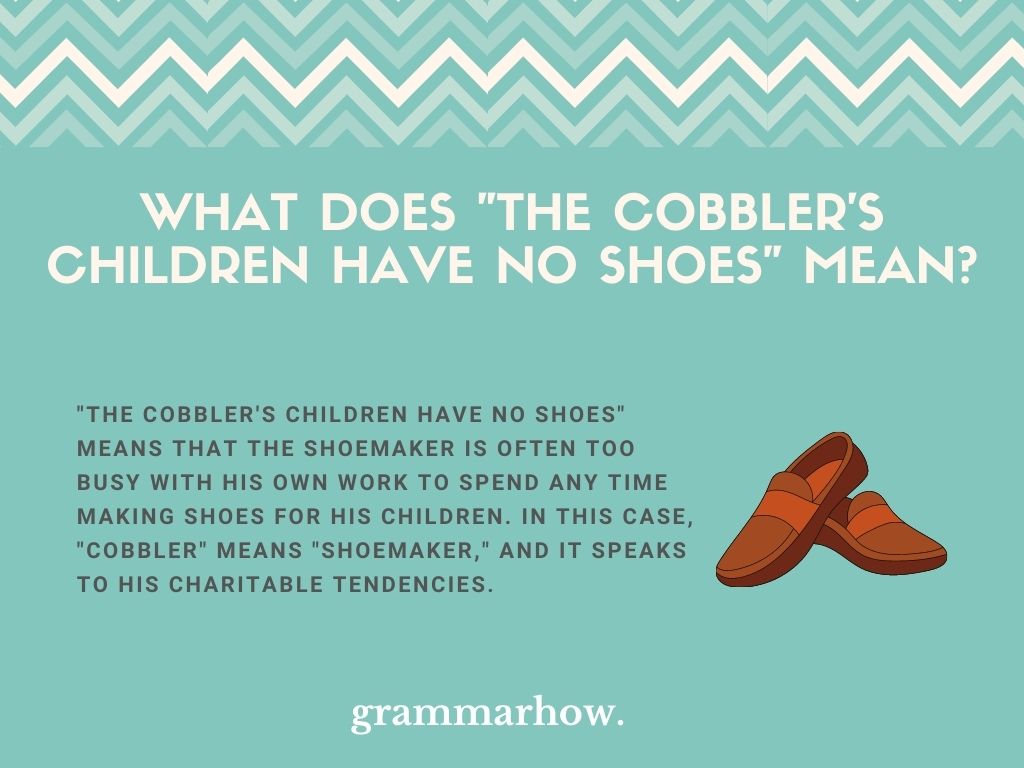Sometimes, we come across phrases and idioms that don’t seem to make sense. However, if we allow ourselves a moment to study their origins, it’s often made clear to us what they mean. This article will look at “the cobbler’s children have no shoes” and what it means.
What Does “The Cobbler’s Children Have No Shoes” Mean?
“The cobbler’s children have no shoes” means that the shoemaker is often too busy with his own work to spend any time making shoes for his children. In this case, “cobbler” means “shoemaker,” and it speaks to his charitable tendencies.

We can use this phrase for just about any profession, provided it allows someone to showcase their talents somehow while also not being able to provide said talents for their families.
It’s likely that some cobblers might not have the time to make shoes for their families because they’re so dedicated to making sure their clients are happy. It’s both a charitable view of the world and a pessimistic way of saying that without the clients, there would be no business.
What Is The Origin Of “The Cobbler’s Children Have No Shoes”?
The exact origin of the phrase isn’t known for certain, and neither is the meaning. Most people assume it’s about a cobbler who can’t provide shoes for his own family because he’s too busy with work.
The Bible
The oldest version of a similar proverb (one that does not benefit from their trade) comes from the Bible. Specifically, we can quote Luke 4:23 to show that “Physician, heal thyself. Whatsoever we have heard done at Capernaum, do also here in thine own country.”
While the language in the above Bible quote is old-fashioned and potentially difficult to read, the idea is that the “Physician” in question will provide healing services to all those who need it, but in doing so, won’t have enough time to look after his own people.
Since then, the “physician” role has adapted over time. We now use it most commonly to talk about a “cobbler,” but realistically, we can apply the phrase and proverb to any profession that requires a great deal of detail.
Dialogue of Proverbs, 1546
After the Bible entry, we also saw the phrase in 1546, where the quote:
- But who is wurs shod, than the shoemakers wyfe, With shops full of newe shapen shoes all hir lyfe?
Again, the language is old-fashioned, but it shows that the shoemaker makes plenty of beautiful shoes for the people that hire him. However, because he spends so much time making beautiful shoes, he leaves no time for his wife to be able to try them out and get new ones.
It’s a phrase that speaks to the altruism and charity that’s commonplace in trades like this. Generally, if you’re trying to make ends meet, you’ll want to make sure your clients are as happy as they can be. If you stop treating your clients well, they’ll often stop coming to you.
Since you need to treat your clients well, you often don’t have time to treat your family in the same way. It’s a common trope and problem that many tradesmen and women still have today.
3 Other Quotes That Are Similar To “The Cobbler’s Children Have No Shoes”
The original phrase is great to help us to understand the charitable and unrewarding business aspects of being a cobbler. However, there are plenty other quotes and proverbs that follow the same general idea that you might not have heard.
- A plumber’s house always has a dripping tap.
Here, the “plumber” is able to treat other people’s drips and tap problems, but they’ll never have the time to fix their own. Of course, in practice, this might not always be true (since many plumbers do their own work), but the idiom holds the same meaning.
- A blacksmith’s home only has wooden spoons.
This one is less common, but we can still use it to show that the “blacksmith” spends his career making amazing gear and silverware for the people who hire him. However, in doing so, he doesn’t have enough time to upgrade from simple wooden spoons.
- The goldsmith’s children have no jewels.
While the goldsmith is happy to work on jewelry and selling it to clients, their children don’t get the same luxury.

Martin holds a Master’s degree in Finance and International Business. He has six years of experience in professional communication with clients, executives, and colleagues. Furthermore, he has teaching experience from Aarhus University. Martin has been featured as an expert in communication and teaching on Forbes and Shopify. Read more about Martin here.
